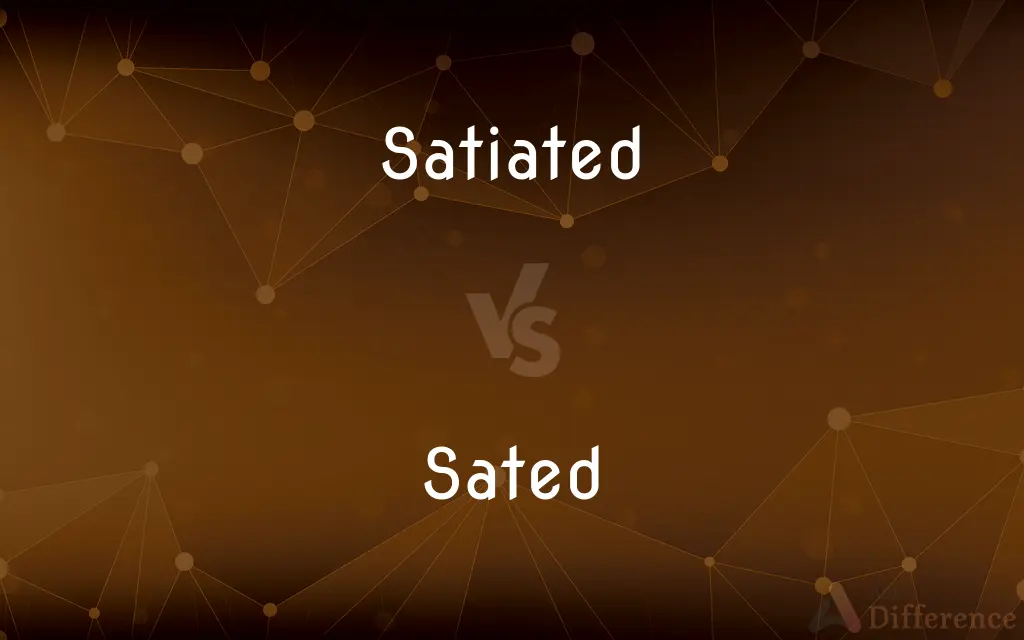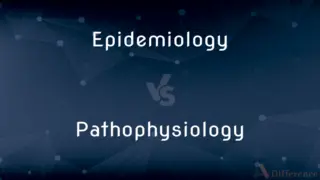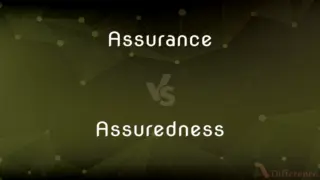Satiated vs. Sated — What's the Difference?
By Tayyaba Rehman & Urooj Arif — Updated on March 12, 2024
Satiated and sated both describe a state of being fully satisfied, especially after eating, but "satiated" often implies a deeper or longer-lasting satisfaction.

Difference Between Satiated and Sated
Table of Contents
ADVERTISEMENT
Key Differences
The terms "satiated" and "sated" are both used to describe the feeling of no longer having a desire for more, typically in the context of hunger or appetite. While both imply fullness, "satiated" often conveys a sense of being fully satisfied to the point of no longer wanting or needing more, suggesting a deeper or more comprehensive satisfaction. On the other hand, "sated" can imply satisfaction but might also carry a nuance of having just enough, potentially without the same depth of fulfillment.
"Satiated" can also be used in broader contexts beyond physical hunger, encompassing emotional or intellectual desires. It implies a state of complete satisfaction where all desires or needs have been met to their fullest. Whereas "sated" tends to be more specific to physical needs, particularly hunger, and might not encompass the broader, more nuanced states of fulfillment implied by "satiated."
In literature and writing, "satiated" is often chosen for its connotation of thorough satisfaction, perhaps after a long period of want or need, suggesting a more profound experience. "Sated," while still denoting satisfaction, might suggest a temporary or more immediate state of having one's appetite quelled, without the depth of experience or duration implied by "satiated."
The preference between using "satiated" or "sated" can reflect the speaker's intent or the specific nuance they wish to convey regarding the level and type of satisfaction. A person might use "satiated" to describe a rich, fulfilling meal that leaves no room for more, while "sated" might be used for a quick snack that temporarily staves off hunger.
Despite these nuances, in everyday language, the distinction between "satiated" and "sated" is often blurred, with both terms being used interchangeably to express the state of being full or no longer in desire of more. The choice between them might come down to personal preference or the context in which they are used, with "satiated" potentially offering a slightly more formal or elaborate tone.
ADVERTISEMENT
Comparison Chart
Definition
Fully satisfied, often implying a deep or comprehensive fulfillment
Satisfied, typically referring to the quelling of immediate desires like hunger
Contexts
Can apply to both physical and broader emotional or intellectual needs
More commonly associated with physical needs, especially hunger
Connotation
Suggests a thorough and possibly long-lasting satisfaction
Implies satisfaction but can suggest a more temporary or surface-level state
Usage in Literature
Often used to imply a profound or lasting fulfillment
Used for immediate satisfaction, may lack the depth associated with "satiated"
Formality
May carry a slightly more formal or elaborate tone
Generally straightforward, used in both formal and informal contexts
Compare with Definitions
Satiated
Fully satisfied to the point of no longer desiring more.
After the feast, the guests were completely satiated.
Sated
Generally used for physical satisfaction.
The cold water sated his thirst.
Satiated
Often used in contexts requiring a thorough satisfaction.
The documentary satiated his thirst for knowledge on the subject.
Sated
Can imply a temporary state of fulfillment.
His curiosity was sated by the brief article.
Satiated
Carries a nuanced connotation of completeness.
The comprehensive report satiated the board's need for information.
Sated
Satisfied, especially in terms of appetite or immediate desires.
A small snack sated his hunger until dinner.
Satiated
Can imply deep emotional or intellectual fulfillment.
She felt satiated after the long, engaging conversation.
Sated
Focuses on the quelling of immediate needs.
The quick response sated the public's demand for information.
Satiated
May suggest a lasting state of contentment.
Their love for each other left them feeling satiated.
Sated
Straightforward, often used in everyday contexts.
The short break sated their need for rest.
Satiated
To satisfy (an appetite, for example) fully.
Sated
To satisfy (an appetite) fully.
Satiated
To provide (someone) with more than enough; glut.
Sated
To provide (someone) with more than enough; glut.
Satiated
Filled to satisfaction.
Sated
A past tense of sit.
Satiated
Pleasantly satisfied or full, as with food; sated
Sated
In a state of complete and thorough satisfaction; having one’s appetite fully satisfied, by having enough of something.
Satiated
Simple past tense and past participle of satiate
Sated
Quelled of thirst or hunger.
Satiated
Supplied (especially fed) to satisfaction
Sated
Fed beyond capacity or desire
Common Curiosities
Is sated always related to food?
While "sated" is often related to the satisfaction of hunger, it can also apply to other forms of physical or immediate desires, though it's less commonly used for emotional or intellectual fulfillment.
How does being sated differ from being satiated?
Being sated refers to the state of satisfaction, particularly with physical needs like hunger, and may suggest a more temporary fulfillment compared to the deeper satisfaction implied by being satiated.
Can emotional needs be satiated?
Yes, emotional needs can be satiated, implying a deep and thorough fulfillment of those needs, a usage more common with "satiated" than "sated."
What does it mean to be satiated?
To be satiated means to be fully satisfied, often in a deep or comprehensive way, typically in relation to hunger but also applicable to other desires.
Do satiated and sated mean the same thing?
Satiated and sated both describe states of satisfaction, but "satiated" often carries a connotation of deeper, more comprehensive fulfillment, whereas "sated" can imply a more temporary or immediate satisfaction.
Is it possible to be too satiated?
Yes, it's possible to be too satiated, especially in the context of eating, where it might imply overindulgence or discomfort from consuming too much.
How can a book satiate a reader?
A book can satiate a reader by thoroughly fulfilling their desire for entertainment, knowledge, or emotional engagement, leaving them feeling completely satisfied.
Can one feel satiated by knowledge?
Yes, one can feel satiated by knowledge, indicating a thorough and satisfying acquisition of information or understanding, a sense often associated with "satiated."
Which is more formal, satiated or sated?
"Satiated" may carry a slightly more formal or elaborate tone compared to "sated," which is straightforward and widely used in both formal and informal contexts.
What is the difference in usage between satiated and sated?
The difference in usage between "satiated" and "sated" often lies in the depth of satisfaction being described, with "satiated" implying a more profound or lasting fulfillment, and "sated" indicating satisfaction of more immediate or physical desires.
Share Your Discovery

Previous Comparison
Epidemiology vs. Pathophysiology
Next Comparison
Assurance vs. AssurednessAuthor Spotlight
Written by
Tayyaba RehmanTayyaba Rehman is a distinguished writer, currently serving as a primary contributor to askdifference.com. As a researcher in semantics and etymology, Tayyaba's passion for the complexity of languages and their distinctions has found a perfect home on the platform. Tayyaba delves into the intricacies of language, distinguishing between commonly confused words and phrases, thereby providing clarity for readers worldwide.
Co-written by
Urooj ArifUrooj is a skilled content writer at Ask Difference, known for her exceptional ability to simplify complex topics into engaging and informative content. With a passion for research and a flair for clear, concise writing, she consistently delivers articles that resonate with our diverse audience.















































